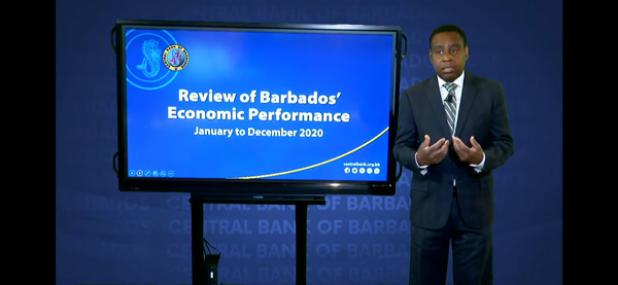
Governor of the Central Bank of Barbados, Cleviston Haynes.
Central Bank governor: A difficult 2020
AT the beginning of 2020, the Central Bank of Barbados expected the economy to expand slightly by 1.75 per cent, but due to COVID-19, there was a contraction of the real economy by 18 per cent.
During the 2020 Economic Review yesterday, Governor of the Central Bank of Barbados, Cleviston Haynes, explained that the pandemic had triggered global recessionary conditions and curtailed international travel. Haynes also highlighted that depressed tourism activity, a dampening of consumption and delayed investment projects led to a sharp contraction in economic activity, elevated the level of unemployment, subdued government revenue and amplified the economic vulnerabilities of the island.
“However, the progress made since the start of the four-year economic adjustment programme with the International Monetary Fund (IMF) enabled us to adapt economic policy, quickly mobilise external funding, build unprecedented reserve buffers and close the financing gap that might otherwise derail our recovery efforts,” said Haynes.
Recovery uncertain
The governor continued by explaining that despite the significant impact on the economy last year, the Bank was hoping for a strong partial recovery in 2021. However, that hope has been muted by the heightened uncertainty caused by the ongoing effects of the virus in the key tourism source markets of the island. The IMF, in its most recent forecast, has raised slightly its global forecast for 2021 and a rebound of growth in the major source markets of Barbados is anticipated. The new challenges faced include the re-emergence of lockdowns and travel bans as well as the tightening of quarantining requirements for travellers, which will slow the recovery of global tourism that Barbados is heavily dependent on.
“The availability of vaccines is expected to slow the spread of the virus and facilitate a gradual return to more normal levels of global economic activity. However, the rollout across markets needs to accelerate, so as to create conditions for the return to a growth-oriented adjustment path,” he said.
The Bank has not yet taken into account any potential effects of the recently announced planned domestic shutdown by the Government on Tuesday evening, but has revised downwards its growth forecast from the range of 7 to 10 per cent to below 5 per cent.
“The forecast is sensitive to the demand for tourism and, given the uncertainty and the omnipresent downside risks in this environment, the Bank stands ready to review and revise its forecast as events unfold,” Haynes said.
The governor expanded further by stating that the 5 per cent growth was an optimistic expectation and the number could be lower. Economic policy will continue to adapt to the economic circumstances and the front-loaded accumulation of reserves in 2020 will allow Barbados to continue to meet its external obligations on time.
Unlike in the rest of the economy, agricultural output was 1.9 per cent higher than a year ago.
The main source of the growth was higher food crop production. Chicken production contracted as tourism and local demand were depressed while milk production suffered from heat-related stress and a deterioration in grazing pasture conditions.
The unfavourable impact of weak economic activity on revenues and the likely need for the Government to continue to address the health and socio-economic issues generated by the pandemic will force the Government to keep its fiscal targets, including for the primary balance and debt, under constant review.
Recommendations
One of the recommendations given by the Bank was the acceleration of the capital works programme of the Government and also for putting in place the infrastructure to secure growth over the medium term. Haynes noted that it was equally important during this difficult period to provide support for tourism-related businesses as it is critical that the sector, comprising businesses and employees, is able to respond nimbly as conditions improve.
The interest rate environment is expected to stay low in the midst of the high level of excess liquidity. Financial institutions will need to continue to work with their clients on a case by case basis, including providing new funding, where appropriate, to minimise the risk of default and help borrowers to navigate these difficult circumstances.
